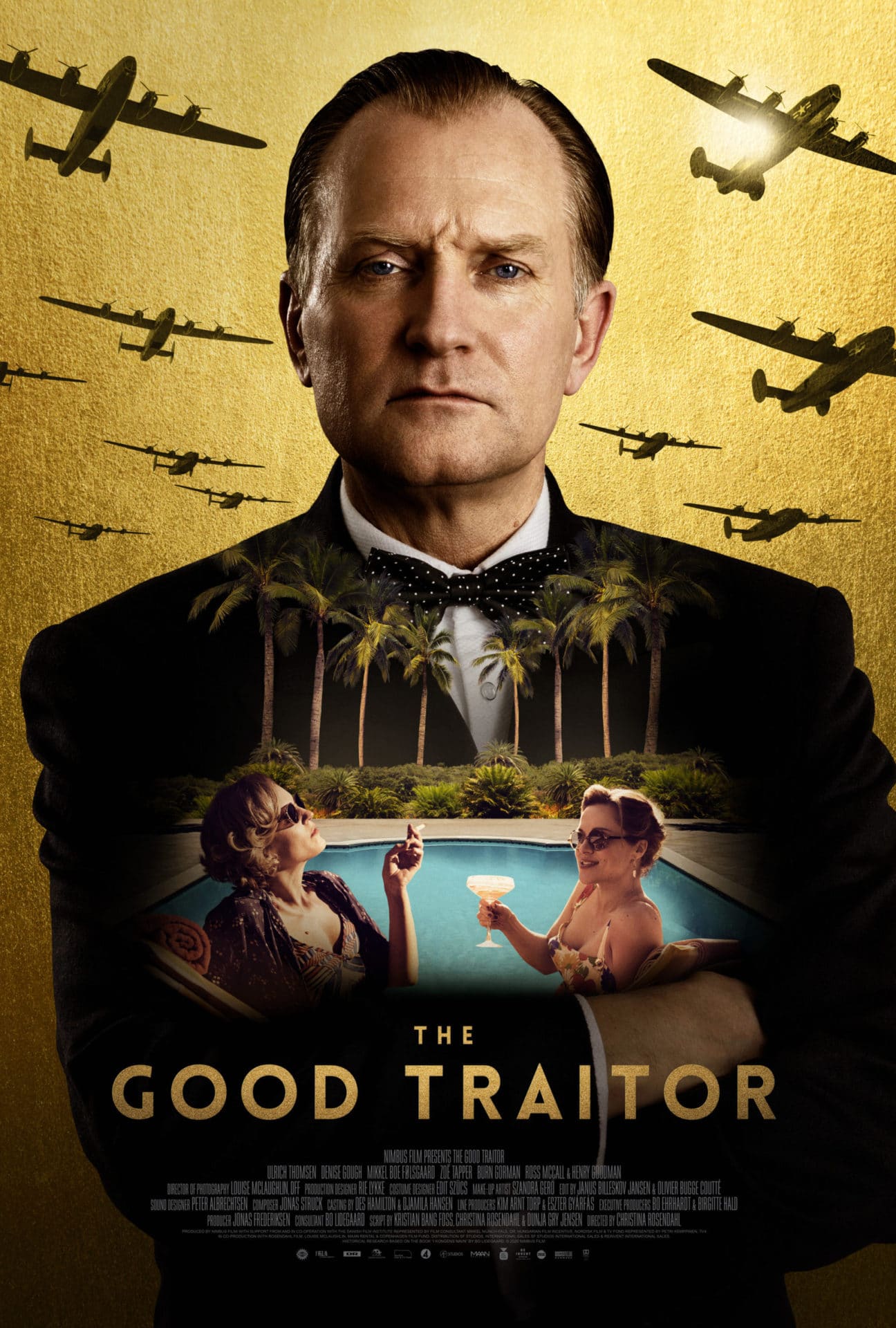
- Starring
- Ulrich Thomsen, Burn Gorman, Ross McCall
- Writers
- Kristian Bang Foss, Dunja Gry Jensen, Christina Rosendahl
- Director
- Christina Rosendahl
- Rating
- n/a
- Running Time
- 115 minutes
- Release Date
- March 26th, 2021
Overall Score
Rating Summary
The Good Traitor tells the story of Henrik Kauffmann (Thomsen), the Danish Ambassador to the United States during World War II. The film’s first act starts in 1939 when Kauffmann moves to Washington D.C. amid rising concerns of a German invasion in Denmark. The film goes on to showcase the course of Kauffmann’s diplomatic actions and the struggles of his personal life.
Ever since films have existed, filmmakers have made films about them. There are a variety of ways in which wars can be depicted and character biographies are one of the most popular ones. The Good Traitor chooses to tell the story of the German Invasion of Denmark, handing over of part of Greenland to the US, and the subsequent entry of Denmark in the United Nations through the lens of Henrik Kauffmann who played a significant role in these events. This part is the film’s strong suit. It manages to keep the tension up to a certain level, something that is expected of a war film. Thomsen’s performance as Kauffmann might not be the best, but it does hold the film together.
The film, instead of focusing just on the war, tries to take a dichotomous approach to Kauffmann’s depiction and makes the mistake of overly focusing on the personal affairs of his life. Now, while it makes sense to give us a peek into this part of the character’s life, The Good Traitor makes the mistake of taking a run-of-the-mill approach and pushing it to the limits. Without spoiling anything, the film tries to extract a lot out of Kauffmann’s love interests where, in fact, there exists little substance. Even if the film wanted to highlight these aspects to such a degree, a unique novel approach could have taken in depicting the relationship dynamics could have been taken. This aspect of the film somewhat neutralizes the impactful nature of the other aspects and puts the pacing of the film into question.
Keeping the romance issues aside, the film, at its core, is about diplomacy, especially in times of war. Kauffmann’s wife, Charlotte Kauffmann (Demise Gough), at one point, remarks “Diplomacy is 50% information and 50% gambling”. This 50% gambling forms the basis of the film. The risks that Kauffmann takes in declaring himself independent and making sure that he is well-protected in the US highlight the delicacy of a diplomat’s role and responsibilities in such fractured times. The resistance of a devoted citizen to give in and accept orders from the fascist enemies, residing in a country that is reluctant to take sides, takes courage and ingenuity to tackle. Kauffmann’s decision to rebel bores a positive fruit for Denmark later, and hence he is labeled as ‘The Good Traitor’. A lot of what takes place in war is decided behind closed doors, and not just on the battlefield. This film, from the point of view, of a diplomat ambassador, gives us a peek into that world.
There are a couple of other aspects that are worth mentioning. The film makes beautiful use of parallelism in various ways, not just via visual imagery, but also via sound design. There are frequent overlaps of military sounds (guns, firings, shellings) with the regular dramatic sound, played over everyday situations. Sometimes over relaxed scenes. This sort of defines the boundary between diplomacy and actual fighting. These overlaps and intermittents remind us that there are different paths to fighting and winning a war. As Kauffmann makes the controversial announcement of declaring his independence, the scene intercuts with his daughters playing in the field of the house, which in itself speaks of the themes the filmmakers are trying to contrast.
Also, the film portrays major world leaders like Theodore Roosevelt (Henry Goodman) and Winston Churchill (Nicholas Blane) as normal humans. This is a rarity that is frequently missing from historicals who often chose to portray as larger-than-life characters. The Good Traitor shows these leaders as a common man, spending time with their families and sharing a drink or two. Charlotte Kauffmann is a family friend of Roosevelt. Henrik often exploits this relationship to get his way.
There are some admirable shots sprinkled here and there in the film coupled with decent production design. But, again, the film is afraid to leave the conventional methods and narrative styles to tell its story, which I think hampers the impact it is trying to create. In the end, The Good Traitor is definitely worth a watch, but do not go in with huge expectations.
still courtesy of Samuel Goldwyn Films
If you like what you read, follow me on Twitter, Instagram, and Medium.
If you liked this, please read our other reviews here and don’t forget to follow us on Twitter or Instagram or like us on Facebook.
Discover more from
Subscribe to get the latest posts sent to your email.

